We Want a New Arena!
Bradley Center rally organized by MMAC featured five speakers touting the benefits of building a taxpayer-subsidized NBA arena.
A courtside cheering section was in place Tuesday, April 28th at the BMO Harris Bradley Center rooting for the team that was performing on the floor of the “functionally obsolete” arena, built in 1988, that is home to the Milwaukee Bucks.
The five who were on the floor, however, were not professional athletes, but all were, indeed, big players. Nor was the crowd cheering an athletic contest, but still they witnessed a game with billion dollar stakes.
The spectators had been invited by Fuel Milwaukee, a group of young professionals, and the Metropolitan Milwaukee Association of Commerce, the business group that formed Fuel Milwaukee. The nearly 200 attendees were there to listen to a presentation and panel discussion cumbersomely entitled: “Exploring the Economic Development Opportunities of MKE’s New Sports & Entertainment District.”
The five worthies on the court were:
- Gary P. Grunau, of the Grucon Group, LLC, owner-developer of Schlitz Park and other properties
- Cory L. Nettles, of Generation Growth Capital, LLC., a former secretary of the former Wisconsin Department of Commerce and a minority investor in the Bucks
- Robin N. Reese, of Vangard Group LLC., a firm that is converting the historic Germania Building into residential space
- Beth Weirick, of Milwaukee Downtown BID #21, whose 150 square block territory includes the arena
- Greg Uhen, of Eppstein Uhen Architects, local partner with Populous in the design of the proposed $500 million arena.
They were joined by Jeff Sherman, founding president of Fuel Milwaukee, and co-founder of OnMilwaukee.com, acting as moderator of the symposium.
Following introductory remarks from Corry Joe Biddle, Fuel president, and Peter Feigin, Bucks President, the panelists presented the party line on why a new arena is imperative for Milwaukee, why a 50 per cent public share of the funding is necessary and how a new “Sports & Entertainment District” would provide “Economic Development Opportunities” for the city — make that “region.”
The evening’s presentations did not produce new facts and figures or statistics behind the financing deal being hammered out between the team, the state, the county and the city. Who needs them? As Grunau said, experts will tell you that “85 per cent of statistics are made up,” anyway.
What Grunau lacked in specifics, he more than made up for in experience. He recounted efforts in 1999 to demolish the elevated freeway then shadowing the proposed site of the arena. At the time, the Harley-Davidson Museum was slotted to be at his Schlitz Park development, and the museum insisted that the freeway be torn down.
Today, the “political situation is more difficult,” he said, but redevelopment of the site as the arena and other facilities is vital. To the north, an arena would “springboard redevelopment of Haymarket Square,” to the north. Other blocks would come into play, providing “growth and connectivity of areas northwest, north and east of downtown.” Grunau also noted that the streetcar is crucial to the arena and ancillary development. The proposed line would travel north from the arena to W. North Ave. and N. Martin Luther King Dr., he said.
“I hope this project will cause the governor, mayor, and county executive to work together.
“They’ve got to get their political differences aside, get together and get it done!” he concluded.
Cory Nettles, like others on the panel, is a Milwaukee lifer. He calls himself the “Native Son,” who ignored the advice of elders who told him to leave America’s most segregated city and “never look back.” Lots of his friends left, he said, but Nettles stayed.
Nettles also spoke from his experience as the “‘point man’ on business and economic development for the state,” and of all panelists, he was most comfortable throwing out numbers and macroeconomic precepts.
“I don’t expect to see another billion dollar project in my lifetime,” here in Milwaukee, he said, referring to the arena and anticipated ancillary development. “There are so few opportunities for a community of our size to do a project of this size,” he added, wearing a “Play it Forward” t-shirt over his dress shirt.
We have “phenomenal assets” in Milwaukee, he said, but they are “under-utilized, under-leveraged and under-capitalized.”
Leverage and capital are key, he said.
The leverage would come from what the group described as the 50 percent public share of the funding of the new arena. Usually, “the smaller the market the greater the public subsidy.” But Milwaukee’s proposed subsidy compares favorably to the national model of 75 percent public subsidy, he said.
Miller Park, for example, was a $395 million project, and it had a 75 percent public subsidy, he said. Lambeau Field’s renovations required a 60 percent subsidy.
Sure, he said we should have a “healthy, spirited discussion on public financing” (just not tonight, it seemed).
But the big issue is “not just what you gain” with a new arena in the form of additional development.
Rather, “the flip side is what you might lose,” if funding cannot be found and if the team leaves Milwaukee. After all, the NBA has a business model, and Milwaukee is on notice to comply with it by 2017, or its Splitsville. A new arena, therefore, is crucial, he said.
Robin Reese, of Vangard Group, also cited her Milwaukee background. She grew up in the Bronzeville neighborhood just north of the proposed arena location, and she remembers the thriving middle-class African American community that surrounded the area.
But, she said, “the freeway destroyed the neighborhoods. There is still nothing connecting these neighborhoods to downtown,” she lamented. The arena would attract new business Downtown and to a new business district in a revived Bronzeville.
Moderator Sherman asked if Reese had a “magic wand,” what would it be?
“Retail,” she said. “People want to live where there is shopping and entertainment.” But hers was one of the few cautionary voices heard warning that an entertainment district might cannibalize existing businesses. She was particularly concerned about the Shops at Grand Avenue, itself an urban redevelopment that has lost its luster, and most of its big-name tenants, like Marshall Fields.
The mall should be activated from the street, restoring the vitality there. (Norquist has made much the same argument.] “If we do too much retail” as part of the arena development, she said, “we will kill the mall.”
Beth Weirick of the Downtown BID invoked Norquist’s name. “What got us to this point?” she asked, where we can seriously talk about wholesale redevelopment of some 30 or more acres of downtown real estate, much of which has lain vacant for over a decade.
The investment in the arena and entertainment district will “make Milwaukee a gotta-get-to-city,” she said. It will bring us income tax, she pointed out, and attract employers and retain employees.
The arena plans are “big, bold, innovative,” she said, and we have to “get this project going.”
Weirick said members of the Bar / Arts / Nightclub economy centered in her district are “excited” about the arena development proposal, particularly the housing component. But future development must not be insular. “Other hospitality zones want us to be thoughtful,” she said. “And to connect with them.”
Greg Uhen, the architect, said the project should not be viewed “only as a sports and entertainment district.
“It should be viewed as an urban neighborhood that happens to have a sports and entertainment district.” The immediate area has great potential, he said, noting that the once-desolate Historic Third Ward, after decades of revitalization, is now recognized as “one of the 10 best urban neighborhoods in the country.”
The new project would create “authentic architecture that fits in with the city,” without mimicking the architecture of an earlier era. (One imagines he has the Wisconsin Center in mind here.)
The new neighborhood will “fill voids, and make areas walkable,” he said.
Today, “you can walk from The Brewery to Mader’s and never run across another person,” he said.
Photos from the Event
Arena Renderings
If you think stories like this are important, become a member of Urban Milwaukee and help support real, independent journalism. Plus you get some cool added benefits.
Plenty of Horne
-
Milwaukee Modernism Gains National Awards
 Dec 15th, 2025 by Michael Horne
Dec 15th, 2025 by Michael Horne
-
New Rainbow Crosswalks Mark Milwaukee’s LGBTQ+ History
 Oct 8th, 2025 by Michael Horne
Oct 8th, 2025 by Michael Horne
-
Welcome Back, Tripoli Country Club!
 May 27th, 2025 by Michael Horne
May 27th, 2025 by Michael Horne


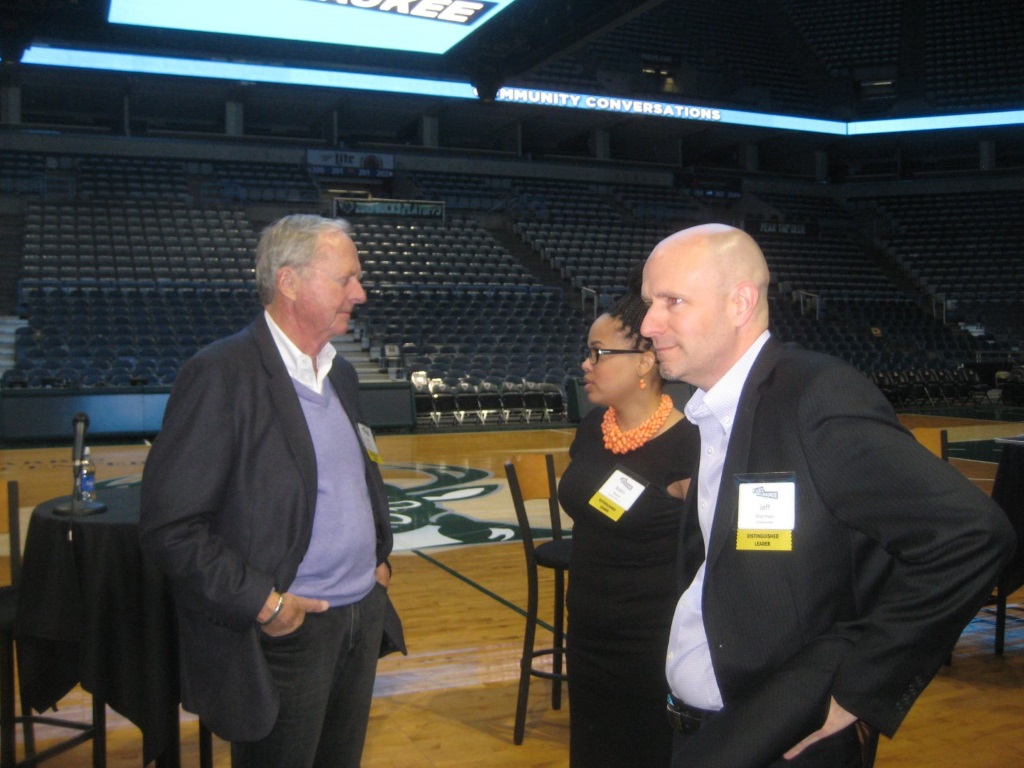
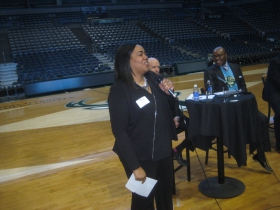
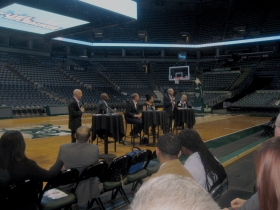
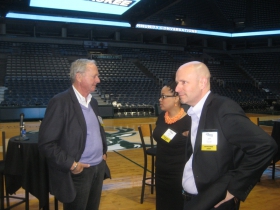
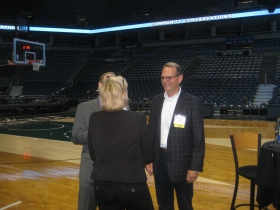
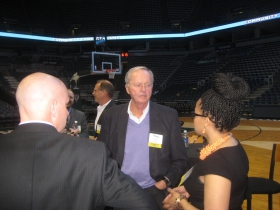
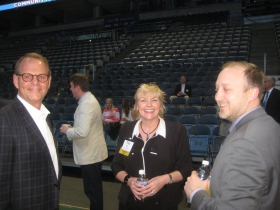
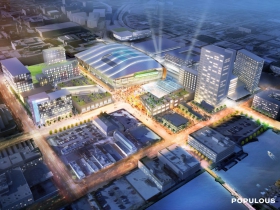
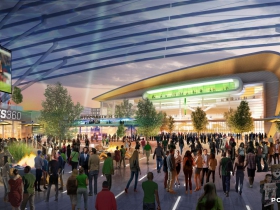
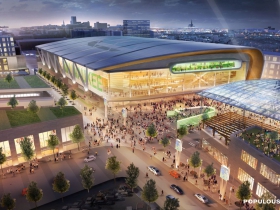
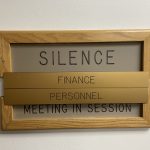
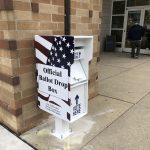


















Yes we do!!!!!
“As Grunau said, experts will tell you that “85 per cent of statistics are made up,” anyway.”
Does that 85% include statistics thrown around by people who say sports venues are great for economic development?
Grunau said taxpayers paid for 75% of Miller Park. Sports-venue experts say Miller Park’s public subsidies actually exceeded 100% of the construction costs (and we’re still paying–worst deal for taxpayers in MLB history).
But if that’s the benchmark, and you don’t count lost property taxes from a massive tax-exempt “Arena District,” then the numbers just might make sense–just not for taxpayers…
F***k no!
I love it when guys like this get together and tell us how much of our money that they want to transfer from our pockets to theirs.
WCD how do you feel about Scott Walker stating that the new arena is of vital importance to the entire state, not just Milwaukee?
“If you’re in Rice Lake or Rhinelander or Green Bay or Superior or anywhere else around the state, you should care,” he said.
Disagree, most of those people do not care about Milwaukee they look to Twin cities.
So what do you think is driving the governor here then? Trying to make allies in the business community happy?
Yeah WCD….. answer a question just ONCE. Also, my friends in GB are Timberwolves fans? Huh….
WCD…. it seems to me you’re out of step with your own party.
Scott believe that Milwaukee will get big black eye like when Braves left and it will hurt our image.
WCD…… no, Scott believes, as do most republicans in this state, that keeping the Bucks here makes fiscal sense.
Pure speculative drivel from five people who will benefit financially from this development.
Or allow someone who will pay property taxes develop the land, instead of this state-sanctioned property-tax grift? Maybe I should convert my house into a stadium entertainment complex so I can avoid paying property taxes?
Also, when the arena development exceeds the estimated mark, who will pay for the excess?
Jeremy…. do we know if the entire area will be exempt from property taxes or just the arena and practice facility? It should not be exempt from property taxes. but no one seems to have the details.
Uhen is right – if this moves ahead, “It should be viewed as an urban neighborhood that happens to have a sports and entertainment district.” That includes proper urban planning, including a high walkability score, grocery stores, pharmacies, parking, etc. Milwaukee has a terrible tendency to create novelty buildings and features without thinking about what will bring people to the area to stay. I have no doubt the new area will be built, regardless of opposition. I just hope they do it right. If they do, they’ll remove some pretty severe eyesores and, hopefully, help bring together the neighborhoods around the arena.
Anyone that believes that the NBA teams make fiscal sense is pure nut. You must read dozens of studies on this. Bruce Murphy is 1000 % right on this which I hate to admit that the is right once in a while. If they put together that whole project it is great but the state is supposed to put up money that they are not getting any return. city will.
WCD…. ” If they put together that whole project it is great but the state is supposed to put up money that they are not getting any return. city will.” If the area is tax exempt, how is the city getting any money? Also, the state will continue to collect millions of dollars in income tax revenue. The city will not see any of that.
A new arena could possibly make fiscal sense for the city if strictly the arena was exempt from property tax and surrounding private, mixed-use development was well-planned & implemented. (Yes, it would still be a massive subsidy…) From anything presented so far, it appears the Bucks are planning whatever they want with little input from the city, other than freebie offers.
The state could change its draft bill for what’s in the tax-exempt zone, but as Bruce reported, it now includes everything and 10 kitchen sinks. Even if the Bucks pay for a new practice facility (w/o public bucks), all they have to do, as state has currently laid out, is turn it over to the state-owned “Arena District.” Then it will become tax-exempt for life, plus taxpayers will have to maintain it. The state now owes $20M on a facility it got for free. The BC gives the Bucks free rent & a huge revenue skim, and thus can’t afford maintenance.
Smoke & mirrors is working for the Bucks with gullible politicians. Why bother to release any facts, do any biz plans, or conduct any feasibility studies about how many more bars & nightclubs downtown can sustain?
I agree. The properties outside of the arena should not be exempt from property taxes.
If the owners of the Bucks aren’t willing to fund the whole project with their own money or with loans taken out on their behalf, why should tax payers be expected to foot the bill for the remainder of the project as a handout?
If the owners are putting up only $300 million of the $500 million required and the taxpayers put up $200 million– then the tax payers should end up with a 40% equity OWNERSHIP of the Bucks.
Isn’t the latter the free-market, free-enterprise, capitalistic approach?
Let’s not get carried away. A real meeting in the middle would that any funds lent by State, county, city, be paid back through some kind of kickback from the stadium operations itself. Its crazy that they do not offer this.
Even worse, there are plenty of non-profits and for-profits operating properties such as senior homes and low income apartments which offer up PILOTs (Payments in lieu of taxes). These guys are not even offering up that.
Professional sports is the only area I can think of that wants to avoid any aspect of this. No wonder franchise values are skyrocketing. Billionaire investors didn’t become that way unless they knew how to get returns far in excess of what a normal retail investor might get trading equities.
Edward Susterich, just so you’re aware… the public is helping finance building an arena (ok, sports and entertainment district… whatever)… not financing buying an NBA team. I understand not wanting to finance an arena, but why would the state become owners of an NBA team that they weren’t involved in the purchase of?
John G makes an excellent point about PILOTs. I belong to a large church which is obviously a non-profit, but we pay for local law enforcement to provide traffic control services where the driveway meets the public roadway. Without property taxes and without PILOTs, it doesn’t sound like the sports & entertainment district will pay for something even this basic.
@AG, let’s not kid ourselves, public financing of the arena = public financing of the team.
The new tax-exempt “Arena District” (governed by a few appointees, not an elected body) may end up overseeing a developed area 3 times larger than current arena footprint. The current arena is only being demanded by the Bucks, who want primarily want more ways to get revenue shares of all commerce. (Marquette U. is served fine by BC, as are Admirals. They pay rent; Bucks do not. Yet Bucks get revenue shares of what’s sold at all arena events.)
As Matt & others noted, this public financing is solely for the Bucks. All deficits (inevitable with how the “District” will be formed and Bucks’ deals that give huge payouts to the Bucks–42 percent of arena-generated income in 2014) will be covered by the public-owned authority, not the Bucks. No other business, or government entity functions this way. It’s certainly not free-market capitalism. But taxpayers have no lobbyists repping us in these deals and elected officials all seem eager to give away the farm.
An equitably arranged arena deal, and private development as described by BB, could be great for MKE & state. Is that even remotely possible?
Except Matt S…. when we’re talking equity ownership, no we’re not. We’re talking about ownership of a building.
Can I flip it around and say the Bucks are subsidizing our ability to have an arena in our city?
AG, UWM loves the “ancient” Panther Arena, but by NBA standards arenas last about 25 years. So taxpayers acquire “equity” and sky-high upkeep of a rapidly depreciating asset–a set-up for losing big. Is there any other business besides ML sports that gets the public to pay much/most of their new digs every 25 years, plus paying no property taxes on those buildings?
Early on, many team owners could not pay for these facilities. Now, many (most?) like Bucks owners can afford to pay for and own their own arenas, but they sill insist that public should. TV income alone is now staggering.
Some cities have made deals fair to taxpayers, but that will take negotiators (including pros) who are not intimidated by Bucks threats to walk. Taxpayers will need a powerhouse bench to not get trounced. Don’t count on it.